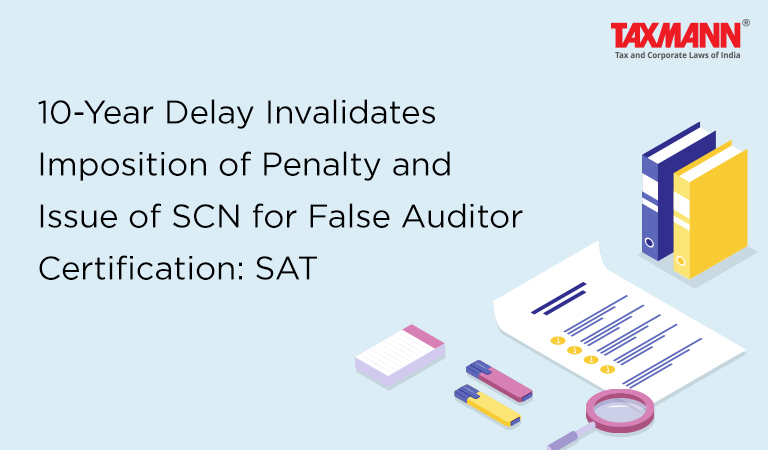10-Year Delay Invalidates Imposition of Penalty and Issue of SCN for False Auditor Certification: SAT
- News|Blog|Company Law|
- 2 Min Read
- By Taxmann
- |
- Last Updated on 4 April, 2023

Case Details: R. Mugunthan v. Securities & Exchange Board India - [2023] 148 taxmann.com 336 (SAT-Mumbai)
Judiciary and Counsel Details
-
- Justice Tarun Agarwala, Presiding Officer & Ms Meera Swarup, Technical Member
- Surasika, Adv. for the Appellant.
- Vyom Shah, Abhiraj Arora, Shourya Tanay & Deepanshu Agarwal, Advs. for the Respondent.
Facts of the Case
In the present case, the appellant filed an appeal against the order passed by the SEBI that imposed a penalty of Rs. 1 lakh for violating provisions of the Disclosure and Investor Protection (DIP) Guidelines and the SEBI (Issue of Capital and Disclosure Requirements) Regulations, 2009.
The Company ‘PSTL’ had allotted 36.40 lakh convertible warrants to its promoter/director i.e., PSS on preferential basis on 22-10-2007. Later, a show cause notice (SCN) was issued to the statutory auditor of company (i.e., the appellant) alleging that the certificate given by him regarding receipt of money from ‘PSS’ for the warrant was allegedly false. Subsequently, SEBI imposed a penalty of Rs. 1 lakh on the appellant.
It was noted that the books of account of the company reflected that an amount of Rs. 11.28 crore with respect to 10% upfront money was received by the company towards the share warrant application account of ‘PSS’ on 15-10-2007, and the company had received the balance of 90% of the allotment money on various dates up to 28-2-2009.
A show cause notice was issued on 3-6-2011 and the impugned order was passed on 7-7-2021 after a period of ten years from the issue of the SCN. The appellant contended that the AO had erred in holding the certificate issued by him as false and that the inordinate delay in concluding the proceedings had caused prejudice to him.
Subsequently, an appeal was made to the Securities Appellate Tribunal (SAT) against the order passed by the SEBI.
SAT Held
The SAT observed that the Respondent had issued notice of hearing on January 10, 2018, after a gap of more than six years from the date of reply filed by the appellant.
The SAT held that a considerable amount of time had elapsed since the impugned transactions took place in year 2007, and in determining the quantum of penalty, the Tribunal had held that adjudication proceedings must be completed in a timely manner.
Therefore, the impugned order by the SEBI imposing penalty on the appellant could not be sustained and was to be set aside.
List of Cases Reviewed
-
- Sanjay Jethalal Soni v. SEBI [2020] 113 taxmann.com 486 (SAT – Mum.) (para 9)
- ICICI Bank Ltd. v. SEBI [2020] 117 taxmann.com 798 (SAT – Mum.) (para 10) followed.
List of Cases Referred to
-
- Rakesh Kathotia v. SEBI [Appeal No. 7 of 2016, dated 27-5-2019] (para 8)
- Ashok Shivlal Rupani v. SEBI [Appeal No. 417 of 2018, dated 22-8-2019] (para 9)
- Sanjay Jethalal Soni v. SEBI [2020] 113 taxmann.com 486 (SAT – Mum.) (para 9)
- ICICI Bank Ltd. v. SEBI [2020] 117 taxmann.com 798 (SAT – Mum.) (para 10).
Disclaimer: The content/information published on the website is only for general information of the user and shall not be construed as legal advice. While the Taxmann has exercised reasonable efforts to ensure the veracity of information/content published, Taxmann shall be under no liability in any manner whatsoever for incorrect information, if any.

Taxmann Publications has a dedicated in-house Research & Editorial Team. This team consists of a team of Chartered Accountants, Company Secretaries, and Lawyers. This team works under the guidance and supervision of editor-in-chief Mr Rakesh Bhargava.
The Research and Editorial Team is responsible for developing reliable and accurate content for the readers. The team follows the six-sigma approach to achieve the benchmark of zero error in its publications and research platforms. The team ensures that the following publication guidelines are thoroughly followed while developing the content:
- The statutory material is obtained only from the authorized and reliable sources
- All the latest developments in the judicial and legislative fields are covered
- Prepare the analytical write-ups on current, controversial, and important issues to help the readers to understand the concept and its implications
- Every content published by Taxmann is complete, accurate and lucid
- All evidence-based statements are supported with proper reference to Section, Circular No., Notification No. or citations
- The golden rules of grammar, style and consistency are thoroughly followed
- Font and size that’s easy to read and remain consistent across all imprint and digital publications are applied



 CA | CS | CMA
CA | CS | CMA
